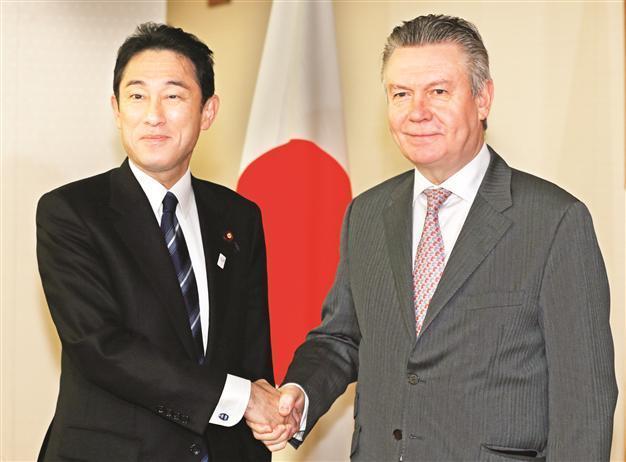Japan and EU agree to kick off free trade negotiations
TOKYO - Reuters

European Commissioner for Trade Karel De Gucht(R) and Japanese Foreign Minister Fumio Kishida pose yesterday at the start of their meeting in Tokyo. AP photo
Japan and the European Union agreed yesterday to launch talks on one of the world’s most ambitious trade deals despite opposition from European carmakers, a test of how far both sides are willing to go in their hunt for economic growth.Japanese Prime Minister Shinzo Abe, European Commission President Jose Manuel Barroso and European Council President Herman Van Rompuy discussed the plan by phone after Brussels postponed an EU-Japan summit scheduled in Tokyo due to the crisis in Greek Cyprus.
“The leaders decided to launch negotiations for an agreement covering political, global and sectoral cooperation,” Abe, Van Rompuy and Barroso said in a joint statement, adding talks should start in April. Brussels and Tokyo want to deepen a relationship that encompasses a third of global economic output but is hampered by regulations closing industries to outsiders.
A breakthrough - and any resulting benefits for growth - will not come quickly.
The talks are expected to take around three years, with Japan seeking to win greater access to the EU market of 500 million consumers for its cars, electronics and investment. The Europeans hope for more business in lucrative Japanese markets such as processed food and railways.
“The (free-trade deal) should be deep and comprehensive, addressing all issues of shared interest in order to stimulate economic growth both in Japan and in the EU and to contribute thereby to the development of the world economy,” the leaders said.
The world’s third-largest economy, Japan is the EU’s seventh largest export market, buying 69 billion euros ($89.68 billion) worth of European goods in 2011.
For Japan, the EU ranks as its third-biggest market with shipments of 6.5 trillion yen ($68.79 billion) in 2012. The European Commission believes a free-trade deal could lift the economic output of both sides by almost 1 percent each.
Japan already has low or zero import tariffs on EU goods, with no duty on cars, Scotch whisky or French cognac for instance, so the real prize for Europe is removing special regulations on everything from music to imported cars.
Reform-minded Abe, who was elected in December, has so far given positive signals his government is ready to move, allowing two European companies to join bidding for Tokyo railway contracts.His decision to join the proposed Trans-Pacific Partnership that would link Asia, the United States, Australia with several Southeast Asian and South American nations is seen as another step to opening Japan’s economy to unlock long-stalled growth.
Skepticism in Europe
European carmakers doubt Tokyo’s commitment to opening up its market.
“We’re more than deeply sceptical. There’s not a single foreign [car] manufacturer in Japan, so there’s really no possibility to enter the market,” Stephen Biegun, Ford vice president of international governmental affairs, told Reuters. At first sight, the EU market is more protected than Japan’s, with a 10 percent tariff on imported Japanese cars and 22 percent on trucks.But EU carmakers say numerous barriers hinder exports. One is Japan’s use of its own safety and environmental standards rather than international ones adopted by the EU, which makes approvals costly and time consuming.
















